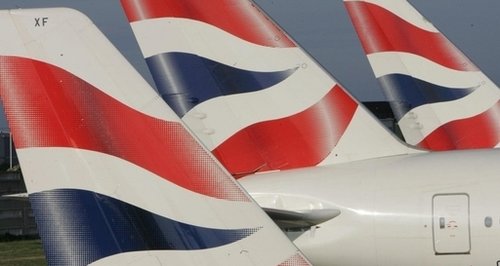Temperatures cause flight delays
26 July 2019, 16:15 | Updated: 26 July 2019, 16:16

Air passengers were facing disruption on Friday due to the heatwave and a technical problem with the UK's air traffic control system.
Just as rail delays caused by the weather were easing, travellers using two of UK's biggest airports were warned that the extreme conditions across Europe had caused flight cancellations and delays.
And air traffic control company Nats said a technical problem with a system at the Swanwick Air Traffic Control centre had been identified, which was causing some flight restrictions.
Nats said in a statement: "We are doing all we can to fix it as soon as possible."
European air traffic co-ordinating agency Eurocontrol said the problem is being caused by an "issue with radar displays" and there will be "high" levels of delay for flights arriving at Heathrow and Gatwick for the rest of the day.
That added to the woes at both airports as they were already asking passengers to check with airlines before travelling due to heatwave-related issues across Europe.
Network Rail engineers worked overnight to repair damage at several locations after the temperature of steel tracks soared to up to 20C higher than the air temperature, while overhead power lines also suffered heat-related damage.
Apologising to commuters for delays and cancellations, Phil James, from Network Rail, said: "I want to say sorry to passengers for the disruption and discomfort they faced making their journeys yesterday.
"The extreme temperatures made travelling by train very difficult at times and we thank passengers for their patience while we worked hard to get people moving again.
"With the railway being made of metal and moving parts, the sustained high temperatures took their toll in places.
"Everything was done to keep trains moving where possible, and last night hundreds of staff were out fixing the damage and repairing the railway ready for today."
Having earlier warned against making non-essential journeys, Network Rail later urged passengers to check for the latest service information before they travel.
Disruption continued on Friday on the Midland Main Line between London St Pancras and Sheffield, as well as to services operated by Great Northern, Thameslink, East Midlands Trains and West Midlands Trains.
West Midlands Railway said overnight work to repair damage was continuing and many trains were starting the day out of place, resulting in some cancellations and shorter trains.
Passengers using Eurostar services to and from Paris were also facing "severe disruption" due to overhead power line problems in the French capital, the operating company said.
British Airways said severe thunderstorms had caused "significant delays and cancellations to our operation in and out of London".
Meanwhile thunderstorms in the south-east of England were continuing to bring heavy rain, gusty winds and lightning on Friday morning.
"The thunderstorms could continue on and off through the course of the day," Met Office meteorologist Greg Dewhurst told PA.
"There is enough energy in the atmosphere to keep it going."
Temperatures will range from the mid-20s to the low 30s on Friday, Mr Dewhurst added.
Along Scotland's Moray Firth coastline the temperatures will range from 25C-27C (77F-80.6F), while in the South East and East Anglia, the mercury will rise to 30C-31C (86F-87.8F).
The Met Office said a new record temperature for the month was set at 38.1C (100.6F) in Cambridge on Thursday afternoon, beating the previous record of 36.7C (98.1F) set at Heathrow in 2015.
There were also record-high temperatures recorded in Europe, including Paris which hit 40.6C (105.1C).
But the country will see more familiar conditions return over the weekend, with the weather becoming less settled and an increased chance of rain for many eastern and north-eastern areas.






